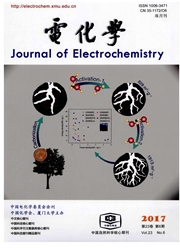

 中文摘要:
中文摘要:
本文研究与分析了铝合金电解加工过程的钝化行为,探讨了加工电压、电流密度、加工间隙及电解液成分等因素对电解加工性能的影响.研究表明,在试验温度(23±1)℃下,铝合金在NaNO3和NaF复合电解液体系(钝化电解液)存在钝化现象,钝化降低了电解加工的电流效率,并使电流效率随电流密度发生较大变化.同时,钝化也使间隙特征曲线负移.而在相同浓度NaCl和NaF复合电解液体系(活化电解液)电解加工,可在很宽的电位范围内保持活性溶解.在钝化电解液中,电解加工表面更加平整.
 英文摘要:
英文摘要:
The passivation behavior of aluminum alloy during electrochemical machining was investigated and discussed. The effects of processing voltage, current density, space of electrodes and electrolyte composition on electrochemical machining performance were explored. The results indicate that the electrochemical machining aluminum alloy in the composite electrolyte system containing NAN03 and NaF existed passivation phenomenon. Passivation action decreaseed the current efficiency and made it varied greatly with the current density. Also the passivation shifted the interspace characteristic curve of electrode notably to a negative direction. There was not passivation phenomenon in the composite electrolyte system containing the same concentrations of NaC1 and NaF for the electrochemical machining of aluminum alloy. It kept active dissolution in a wide range of potential. More uniform machining surface could be obtained in passive electrolyte.
 同期刊论文项目
同期刊论文项目
 同项目期刊论文
同项目期刊论文
 Kinetic investigation on the confined etching system of n?type Gallium arsenide by scanning electroc
Kinetic investigation on the confined etching system of n?type Gallium arsenide by scanning electroc Parameter Identification of the Generalized Prandtl-Ishlinskii Model for Piezoelectric Actuators Usi
Parameter Identification of the Generalized Prandtl-Ishlinskii Model for Piezoelectric Actuators Usi Motion Control of Piezoelectric Positioning Stages: Modeling, Controller Design, and Experimental Ev
Motion Control of Piezoelectric Positioning Stages: Modeling, Controller Design, and Experimental Ev Modeling and Compensation of Asymmetric Hysteresis Nonlinearity for Piezoceramic Actuators with a Mo
Modeling and Compensation of Asymmetric Hysteresis Nonlinearity for Piezoceramic Actuators with a Mo Motion control of piezoelectric positioning stages: modeling, controller design and experimental eva
Motion control of piezoelectric positioning stages: modeling, controller design and experimental eva Real-time inverse hysteresis compensation of piezoelectric actuators with a modified Prandtl-Ishlins
Real-time inverse hysteresis compensation of piezoelectric actuators with a modified Prandtl-Ishlins A Modified Prandtl-Ishlinskii Model for Rate-dependent Hysteresis Nonlinearity Using mth-power Veloc
A Modified Prandtl-Ishlinskii Model for Rate-dependent Hysteresis Nonlinearity Using mth-power Veloc High-precision control of piezoelectric nanopositioning stages using hysteresis compensator and dist
High-precision control of piezoelectric nanopositioning stages using hysteresis compensator and dist An experimental comparison of proportional-integral, sliding mode, and robust adaptive control for p
An experimental comparison of proportional-integral, sliding mode, and robust adaptive control for p Design and control of a decoupled two degree of freedom translation parallel micro-positioning stage
Design and control of a decoupled two degree of freedom translation parallel micro-positioning stage High-bandwidth tracking control of piezo-actuated nanopositioning stages using closed-loop input sha
High-bandwidth tracking control of piezo-actuated nanopositioning stages using closed-loop input sha Comparative experiments regarding approaches to feedforward hysteresis compensation for piezoceramic
Comparative experiments regarding approaches to feedforward hysteresis compensation for piezoceramic 期刊信息
期刊信息
